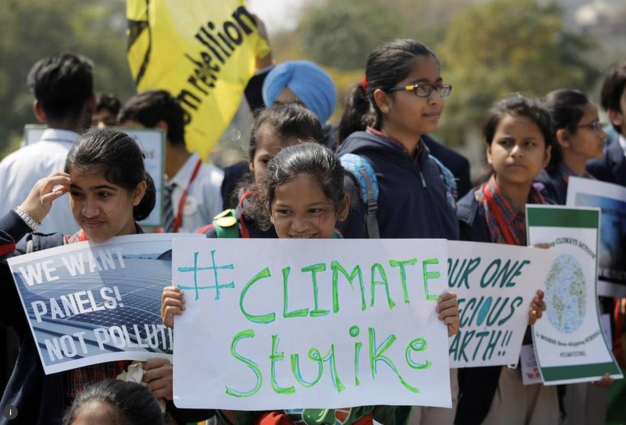
The fight of our lives for their futures: climate action needed now, for every child
Every government in the world must do all it can to prepare children for life in a climate-changed world by giving them the skills to survive and thrive, says the head of children’s charity UNICEF.
As climate changes intensifies in the coming decades, Catherine Russell says it will be children that suffer the most from an expected ‘devastating impact’ on lives, livelihoods, foods and water systems
Speaking at the Intergovernmental Panel on Climate Change’s (IPCC) Synthesis Report of the Sixth Assessment Report, she said its report had already made clear how the world was being ‘ravaged’ by the consequences of climate change.
“Just last year, we saw a series of deadly climate-linked disasters, including catastrophic floods in Pakistan, historic drought in the Sahel and Horn of Africa, and blistering heat waves across parts of Europe and the Middle East.
“Such events are compounding the severity of existing humanitarian crises, while also unleashing new waves of mass displacement, malnutrition and disease. They are also leading to competition for scarce resources, like water, increasing the risk of intercommunal conflict.
UNICEF’s own global analysis had shown that ‘virtually every child’ is already exposed to disruptive climate hazards.
“One billion children – nearly half of the world’s total child population – are at ‘extremely high risk’ due to a deadly combination of high exposure to climate hazards and insufficient essential services to help them cope.
“Climate change is also inextricably linked to water and food insecurity – to which children are especially vulnerable. Around the world, 450 million children live in areas of high, or extremely high, water vulnerability, while 27 million children under five are facing severe food insecurity linked to drought.
“At its heart, the climate crisis is a child rights crisis. And it is robbing children of their health and homes, their cultures and way of life, and their futures.
“Yet despite the clear evidence, the calls of young people, and the newly enshrined human right to a clean, healthy, and sustainable environment, global climate action is falling far short. World leaders continue to make inadequate promises and slow progress — on emissions reduction, climate finance, adaptation, and on strengthening community resilience.
“About 4.2 billion children are expected to be born over the next 30 years. It is our collective responsibility to make sure they are prepared. UNICEF is urging world leaders and the international community to put children and future generations at the center of urgent climate action so that we can secure a livable future for all. This includes taking four critical steps.
‘It is our responsibility to make sure children are prepared’
“First, all parties must super-charge efforts to close the emissions gap and accelerate the transition from fossil fuels to renewable energy. Developed economies — especially the major emitters — must reach net zero emissions as close to 2040 as possible and support emerging economies with know-how and finance to hit their 2050 targets.
“Second, children and their communities must be protected from climate devastation. We urge all governments to adopt climate resilient development policies and to urgently adapt the critical social services children rely on— like water and sanitation, health, nutrition, education, and child protection — to our new climate reality.
“Next, safeguarding children – especially the most vulnerable – requires a monumental increase in financing. Pledges to double climate finance must be honoured and then increased. Funding for adaptation must be drastically scaled-up, with the essential social services children rely on prioritised, recognising their unique vulnerability.
‘The report is a clear call we must act now’
“We must accelerate progress to provide funds to countries already experiencing irrevocable loss and damage from climate change. But this funding must be in addition to existing adaptation and humanitarian efforts. Climate finance reforms can help achieve this.
“Finally, every government must ensure that children are prepared for life in a climate-changed world by giving them the skills to survive and thrive. Disaster Risk Reduction training will save lives immediately. Climate education and the provision of ‘green skills’ will enable them to meaningfully participate and contribute solutions to shaping a more sustainable world where economic development and environmental sustainability go hand-in-hand.
“This IPCC report is a clear call that we must act now to secure a livable and sustainable future for all. The decisions we make and the actions we take are shaping the world our children will inherit. Let us show succeeding generations that when they needed us to fight for their future, we did.”




